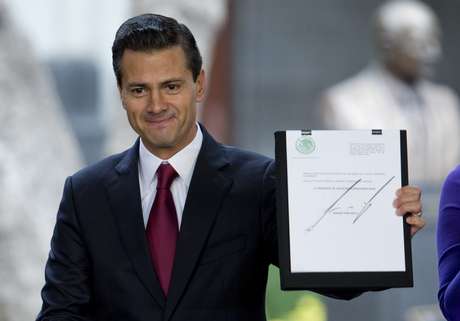Pena Nieto Allows Use Of Marijuana For Medicinal Purposes
President Enrique Peña Nieto proposed a reform to allow in Mexico the use of marijuana for medicinal purposes and increase the amount of cannabis for personal consumption that will not be penalized, in an approach that has divided opinions among those who consider it a good step and the ones who see it as a only a limited measure.
The president said that his proposal seeks to authorize the use and importation of marijuana-based drug makers and / or their active ingredients.
In addition, he suggested that the amount considered for personal use and without punishment be increased from five to 28 grams, which for some experts means to have between 25 and 30 marijuana cigarettes. Having more than that will continue to be penalized.
Peña Nieto said that chemical research would also be authorized for products containing marijuana.
"We Mexicans know well the scope and limitations of the essentially prohibitive and punitive scheme, and the so-called war on drugs, which has prevailed for more than 40 years, internationally," he said.
"As a few, and I expressed this in the United Nations, our country has suffered the harmful effects of organized crime, linked to drug trafficking," he added.
Like his predecessor Felipe Calderón, Peña Nieto has maintained the deployment of thousands of soldiers and federal police to face drug trafficking and organized crime. Although in some parts of the country violence has declined, in others it has remained or even increased.
It is estimated that more than 100,000 people have died and more than 27,000 have disappeared since 2006, when the frontfight against drug cartels began.
The proposal, which has yet to be analyzed and eventually approved by Congress, is still short compared to other cities and countries that have legalized marijuana not only for medical use but also recreational.
"It is a modest but important step in the right direction, particularly due to Peña Nieto's previous resignation to get involved," said Ethan Nadelmann, executive director of the Drug Policy Alliance.
Until recently, the president was speaking out against the legalization of marijuana, although he was willing to listen to the different voices.
Just Tuesday, the Mexican president suggested from the United Nations move toward legalizing the use of marijuana for medical and scientific purposes.
In Mexico is the possession of some drugs for personal use since 2009, including marijuana.
In order to advance the changes, Mexico would be placed in Latin America halfway between countries like Cuba and Venezuela that have a total ban on the consumption of any drug and others such as Uruguay where the marijuana market is legal.
In comments to The Associated Press, Nadelmann said other countries have done more and recalled that in the coming months a possible vote is expected in California and perhaps elsewhere in the United States to legalize marijuana, which should broaden the debate in Mexico.
"Why, after all, should Mexicans continue to lose lives and money by trying to enforce an unenforceable ban when just north of the border, Americans take the business away from criminals and direct tax revenues from marijuana to beneficial ends?" , Added.
Colombia and Ecuador have decriminalized the possession of up to 20 grams and Paraguay considers up to 10 grams the amount for personal use.
Peña Nieto's approach is made at the end of a series of forums on the use of marijuana in which the need to legalize it for medicinal purposes was repeated.
The issue had a boom in 2015 when some judges granted amparos to some families so they could import cannabis drugs and take care of their children.
To that was added a ruling of the Supreme Court that granted an amparo in which it considered legal the cultivation, the harvest and the consumption of marijuana for personal and recreational purposes. The decision favored a group of four people, but in order to be generalized in the country, the Court must resolve in the same sense a total of five appeals.
Peña Nieto said that his proposal seeks to avoid two types of injustice: one that prevents people from having access to medicines and one that leads to prisoners of small quantities.
According to Juan Francisco Torres Landa, of the United Kingdom organization against crime, it is a plan "limited in scope" that does not prevent organized crime from maintaining control of marijuana by not presenting measures, for example, on how it can acquire someone Those minimum doses for which will not be penalized.
"The crime must be fascinating, it must be saying that it is better than before, that 'my consumers can sell more marijuana,' ' he told AP Torres, one of the promoters of amparos to advance in a total regulation of the marijuana market.___
Contributed to this story by The Associated Press correspondents in Latin America



Comments
Post a Comment